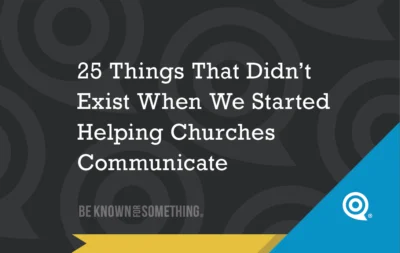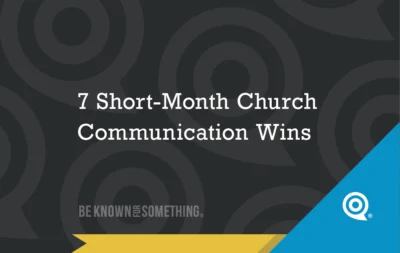True thankfulness: communicating gratitude that connects

We’re just a couple weeks away from Thanksgiving. Though you might not know it by the jingling commercials already flooding your screens! Thanksgiving has quietly become the official start of the Christmas season — and that’s unfortunate.
Because we have so much to be thankful for. Salvation. Grace. Mercy. Family. Friends. But in the middle of holiday chaos, has your church paused long enough to demonstrate authentic thankfulness? Gratitude isn’t a seasonal event — it’s a lifestyle that points others to Jesus.
When communicated well, thankfulness strengthens your thread — that connection between what your church is known for and what your community truly needs. But if it’s done poorly, even well-intended words can feel hollow or manipulative.
I’ve always appreciated Gary Chapman’s reminder about “love languages.” Mine happens to be words of affirmation. But even those words — the ones meant to encourage — can fall flat if they’re delivered with the wrong tone or motive.
People today are wary of empty praise. They’ve seen enough sarcasm and self-serving communication to recognize when thankfulness isn’t genuine. So, as you enter this Thanksgiving season, make sure your expressions of gratitude communicate what you really mean: you matter to this ministry.
Here are two communication reminders to help your thankfulness connect:
1. Don’t have hidden motives
When you express gratitude, make it completely about the other person. No strings attached. No “thank you, and by the way, could you…”
Paul modeled this kind of sincerity when he wrote, “I never stop giving thanks for you as I remember you in my prayers” (Ephesians 1:16). His gratitude was pure and prayerful — not transactional.
Use this season to genuinely thank your congregation, volunteers, and ministry partners — simply because you’re grateful for them. Period.
Example:
“Sarah, I’m truly thankful for how you’ve ministered to the kids in your Sunday School class. Please let me know if you ever need anything — or a break from teaching!”
That kind of message communicates care, not manipulation.
2. Speak to who they are, not just what they did
Anyone can praise completed tasks. But authentic thankfulness recognizes character and growth. When you affirm someone’s heart, you build trust and strengthen your church’s relational thread.
Proverbs 16:24 reminds us, “Pleasant words are a honeycomb: sweetness to the taste and health to the body” . Your sincere encouragement can refresh weary hearts and inspire continued service.
Example:
“Ben, you’re so dependable every week in your service. I’m thankful for your faithfulness — you’re truly a blessing from God.”
Those few extra words go deeper than a simple “thanks.” They tell the person they’re seen, valued, and loved.
So this week, make a list of several people who deserve genuine gratitude. Speak it — or better yet, write it. A short, handwritten note will leave a lasting impression that digital messages rarely do.
And as you prepare for Thanksgiving, remember: authentic gratitude doesn’t just fill stomachs; it fills hearts.
Let’s make sure our words reflect the heart of Psalm 9:1 — “I will thank the Lord with all my heart; I will declare all your wondrous works”.
Happy Thanksgiving from all of us at Be Known for Something.
Want 25 Game-Changing Resolutions?
Related Posts

25 Things That Didn’t Exist When We Started Helping Churches Communicate
Back in 2001, we launched Be Known for Something from the old Krispy Kreme test-kitchen and marketing offices in Winston-Salem,

7 Short-Month Church Communication Wins
February is the shortest month of the year, which makes it perfect for simple church communication improvements that don’t require

Church Communication Starts Before You Speak
Church communication does not begin with a sermon. Instead, it begins the moment someone arrives on your property. Before a

